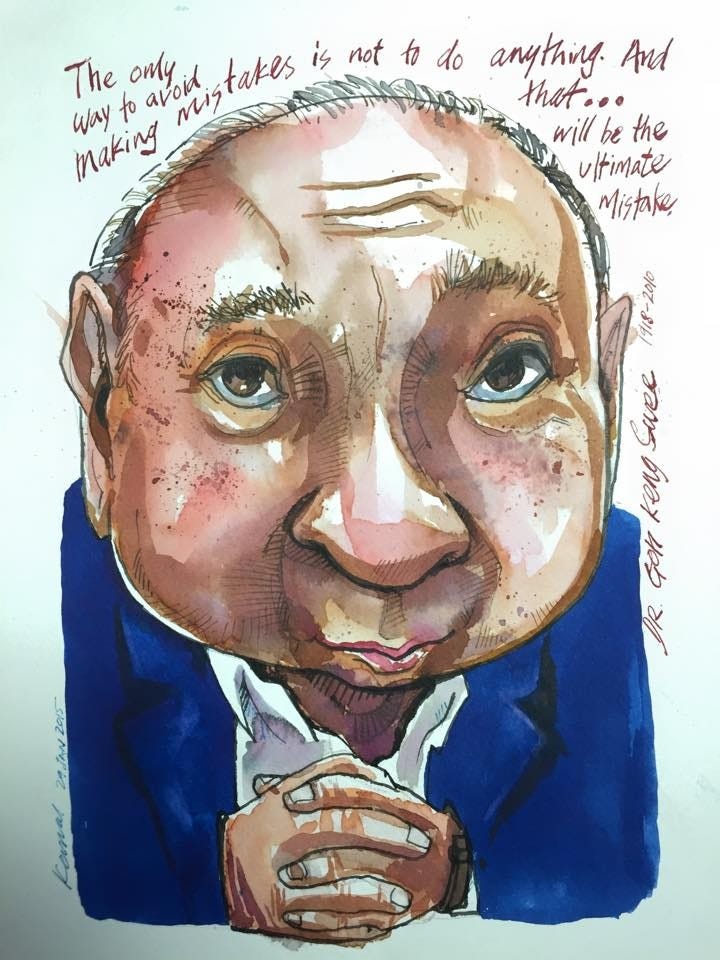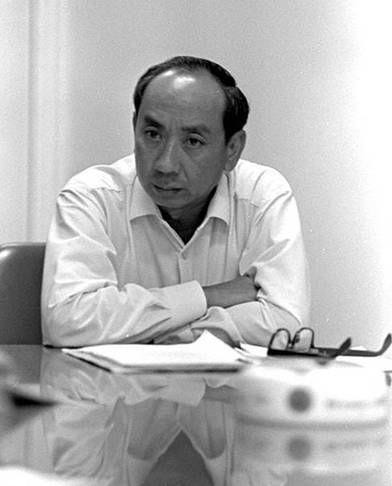Goh Keng Swee was one of the founding fathers of Singapore, perhaps the crucial one. From before independence up to the time he stepped down as Deputy Prime Minister in 1984, Dr Goh imagined, birthed and nursed not only all the economic, financial and industrial and development institutions and policies upon which Singapore’s success is based, but also took under his wing Singapore’s education and defence portfolios.
Whilst the world remembers Lee Kuan Yew as the indispensable first leader of Singapore, it is at least arguable that it was Dr Goh whose imagination and diligence secured its economic, financial and even diplomatic foundations. It also seems likely that Dr Goh, though doubtless a scary boss, would not have welcomed the tightening and deadening conservatism of LKY’s later years.
Maybe Dr Goh was the velvet hand inside LKY’s steel gauntlet.
The 1972 collection of his essays ‘The Economics of Modernization and other Essays’ is out of print (why?), but a pdf copy can be borrowed, an hour at a time, from the University of Arizona. It is well worth reading, since it is rare to encounter such a fertile and supple mind able to write so elegantly. What emerges is a master landscape-painter compelled by circumstance to work, and work hard, on miniatures.
Those essays illustrate Dr Goh’s preoccupations during the 1960s and 1970s, a period when it was quite possible - likely even - that Singapore as a nation would not survive. The breadth and profundity of thought allied with his command of detail, is all the more remarkable for having flourished in that environment.
In 2023, any observer can see that the British establishment has failed the country, and that the nation, its economy, its institutions, its society and its morale, will have to be rebuilt from the foundations up. It is with that in mind that I have picked out some themes from Dr Goh’s essays. The selection is by no means comprehensive.

The Point of Growth
‘When we talk about economic development, we often forget that what we really mean is how to make man better off materially - how he can have more and better food to eat, better homes to live in, better education for his children, better means of transportation, more leisure, in fact, how man can achieve a fuller life. Building of factories, opening of docks, railway lines, mines and power stations are merely the means whereby man can have a fuller and more meaningful existence.’
Citizenship
The importance of moral values to good citizenship is obvious. We want people who have a sense of social responsibility, who are able to overcome their innate instincts of greed, personal vanity and other human weaknesses in the interest of the common good. Without a widely accepted code of moral values, Singapore will remain what it is now - a community which is basically self-centred and selfish.
Economic Growth and Nation-Building (Patriotism)
“I want to discuss the trade-off between economic growth and nation-building. At first sight, it might appear that there is no conflict of choice between the two. You may argue that economic growth helps nation-building and nation-building in turn helps economic growth. As people improve their standards of living they become more conscious of their common identity and common interests, and as unit and solidarity improve, people are better enabled to increase the GNP. This, I am afraid, is a simplistic version of social economic processes. In the real world. . . . things do not work out this way.
[Partly this is owing to the incentives of the entrepreneurs vital to economic growth.] ‘These are the successful and they set the trend, the style, the ethos - call it what you will. Unless our society is tempered with a broader vision, it is easy to see that the prevailing values will be self-centred, self-seeking and concerned with short-term interests. Nation-building does not flourish in a climate of this kind’.
‘The choice between economic growth and nation-building, . . . is not a choice of all for one and nothing for the other. It is how much of one at the expense of how much of the other.”
The Drag of Taboos
‘The belief in the omnipresence of evil spirits is so widespread among primitive people that even in ordinary conversation certain words and expressions are forbidden. They believe that these taboo word will attract the unwelcome attention of dread evil spirits. . . . We moderns expect - and rightly so - that all our citizens will conduct their lives on a rational basis and not succumb to primitive superstition.
‘And yet, in the conduct of affairs of state in backward countries, the approach to basic problems, in particular to the problems of economic development, resembles the mental approach with which the primitive tribesman tries to overcome his private misfortunes.’
Politics and Democracy
“In the long run, since all men are mortal, political stability cannot be allowed to depend on a few men. What is needed is an influential and cohesive social class that will ensure a high standard of performance among political parties contending for support among the electorate. That kind of political climate can be produced only if the great majority of those who have received higher education take a personal interest in the affairs of the country, make an effort to understand these issues, and are willing to provide leadership in the formation of public opinion.
“Only under such circumstances can a democratic society ensure high standards of government, irrespective of which contending parties win the general elections and form the government of the day. When we achieve this in Singapore. we would have achieved long-term political stability.”
Democratic Involvement
‘The great things we are trying to achieve in Singapore will come to fruition only if the democratic system survives and endures. To ensure this, our educated elite must avoid the fatal mistake . . . of withdrawal from leadership of opinion. A French politician once said that war is too serious a business to be left to the generals. If I may parody him, politics is too serious a business to be left to the politicians’.
Education & Academic Success
“I think there has been far too much emphasis on academic performance. . . . At present the general complaint is that the young have to spend so much time in studying that they have very little time to do anything else, such as playing games. An education that lays too much stress on the academic as against the physical and moral side of life is unbalanced and lop-sided.
“I think this obsession with getting outstanding results in the Cambridge examinations is a very bad thing. . . . The preoccupation in Singapore with examination results is unnatural and unhealthy and we should bring it to an end as early as possible. After all, good performance in examinations only proves one thing - ability to answer examination questions. ‘
“I think there are three matters or aspects of education which have been neglected in Singapore , possibly as a result of over-emphasis on examinations. These three aspects are 1) creative imagination, 2) character, 3) moral values.’
Academic Freedom
“There are some students who believe - and I am told they quite honestly believe this - that the Government maintains a large corps of Special Branch agents to identify and root out heresy among the student body. These people flatter themselves. The number of students with pro-communist inclinations at the University of Singapore is pathetically small and their quality poor. Other forms of intellectual heresy we are not interested in.
“You may say that the PM, Mr Lee Kuan Yew, on his visits to the campus acts as an intellectual depressant. Mr Lee is a much misunderstood man . . . I know of his intense desire that our university should be the centre of bold and creative thinking about the manifold problems facing the Republic. But each time he goes to the campus, he finds himself confronted by evidence that neither the student body nor some members of the staff have the slightest inkling of the problems that we face, much less about their possible solutions. His reaction to disappointments of this kind has been characteristically vigorous as some of you would have personally witnessed.’
But . . .
“When people talk about ideas, values and ideals which are trivial or irrelevant to our situation, what you get is not consensus but a babel of noises, a lot of posturing, a habit of opposition for the sake of opposing - in other words, a lot of hot air generated by chatterboxes. Some people in Singapore labour under the illusion that this is democracy. The experience in Asian states where such practice flourishes shows that democracy dies quickly when the educated dissipate their energies this way.
The Impact of Confucius
“It is noteworthy that in spite of its great cultural and literary achievements, ancient China never developed modern science and technology as we know it today. No doubt this was partly due to the rigid social conformity produced by the Confucian ethic and the intellectual straight-jacket into which the best minds of the country was put by the examination system. For the development of scientific thinking has as its basis a respect for free intellectual speculation and also opportunities for creative innovation. These ran contrary to the spirit of the Confucian system.’
Parasite States
‘Where the power of the government was not restrained, one notices an almost inevitable trend towards excessive luxury. Such governments can be considered ‘parasite’ governments in that they consumed far more of the wealth of the country than what they earned. ‘
‘Where a society is governed by what is basically a parasite government, no amount of foreign capital in-flow or technical assistance can make for enduring change and bring about the upsurge of production necessary for self-sustaining growth.’
Corruption
‘There are many economists, . . who believe that economic development in poor countries is possibly in spite of corruption. In theory, they may be right. But they assume that human avarice can be kept within tolerable limits, and this is contrary to the experience of history.
“ . . the filching of surplus value by corrupt politicians and civil servants would mean the transfer of resources from capital formation either into a Swiss bank or into conspicuous consumption. In either case, the effect on development is bad. But such technical economic effects are minor compared with the demoralization which corruption spreads throughout the whole of society.”






Do you think Singapore separating from Malaysia is a good historical parallel to Brexit?